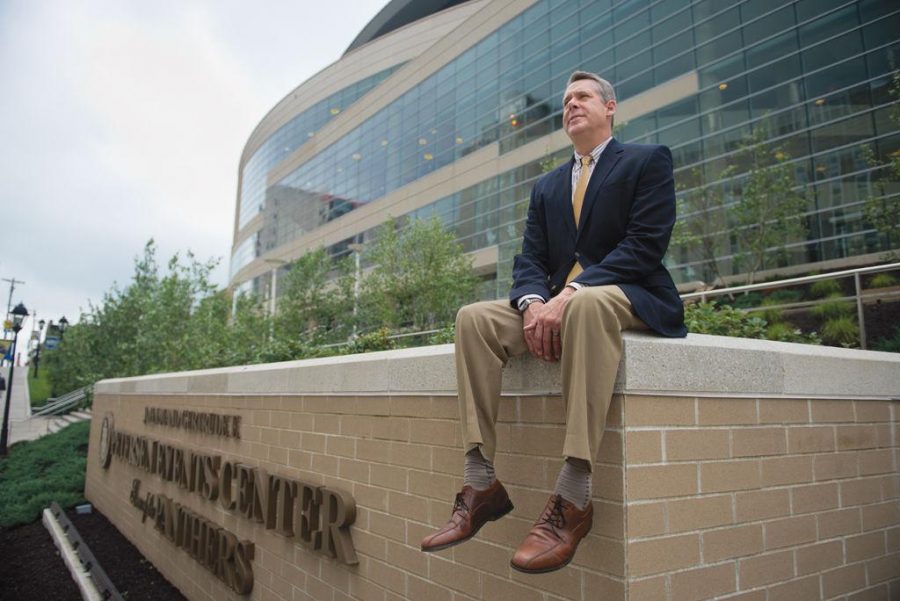Pat Narduzzi’s revitalized football program, a consistently packed Oakland Zoo and alumni all over the world means that Pitt Athletics has no shortage of fans.
But, unlike other Atlantic Coast Conference schools, that fan base doesn’t translate into cold cash.
With the second-largest alumni base in the ACC, Pitt has potential for high donor engagement. But given Pitt’s 300,000 living alumni, athletic donations are meager — the University’s athletic donor engagement rate is the second lowest in the ACC, according to Pitt Athletics spokesperson E.J. Borghetti.
In 2015, 25,062 alumni donated a total of $29,260,124 to the University overall. Out of those 25,062 people, 8,000 donated to the athletic department.
The engagement rate was about 2.6 percent last year, close to half the average percentage for ACC donor engagement, Athletic Director Scott Barnes said at a town hall meeting in January. The number of alumni donors at Pitt has decreased every year since 2012, when 25,728 people donated to the University.
Since his hire in 2015, Barnes has discussed revamping Pitt’s tactics for alumni outreach. In January, he said he was “licking his chops” at the potential of Pitt’s vast — but sluggish — donor base.
“We haven’t really had a culture of major gift fundraising,” Barnes said at a town hall meeting. “We just sort of haven’t. It creates a sense of urgency.”
Patrick Bostick is the director of development for the Panther Club, the main fundraising program for Pitt Athletics. He said the University’s fundraising strategies just haven’t reached a big enough audience.
“We have relied on a fundraising model that’s heavily dependent on ticket-driven donations, so season tickets require a donation,” Bostick said. “We need to address markets where donors exist that don’t necessarily need to buy a ticket to be a member.”
Barnes is going to need the money. He’s planning for $8 to $10 million in renovations to Pitt’s athletic facilities, including enhancements to the swimming and diving team room that will cost $4 million.
“[Moving to the ACC is] a significant lift,” Barnes said. “How are we going to bring the resources to compete at that level?”
Other ACC schools have gotten creative with special programs and strategies to boost funds.
Clemson’s “I Pay Ten A Year” program encourages every alum to donate $10 annually to the university’s athletic department. The school’s strategy, combined with its existing fundraising efforts, raised $60.1 million in athletic department donations in 2015.
Bostick said he’s optimistic that Barnes will do the same for Pitt.
According to Bostick, Barnes will focus on cultivating private support and expanding the alumni donor base at the University, largely through social media campaigns.
While the Panther Club traditionally reached donors through direct mail, engagement methods now focus on online media, where many Pitt alumni already check for updates on Pitt sports.
In the past, the Panther Club has focused on reaching out to former athletes, fans and season ticket holders, but Bostick said it’s time to change that strategy.
“We need … to address philanthropic giving and non-ticket-driven giving,” Bostick said. “That will be a huge focus of ours as we look at expanding not only our donor base but certainly the alumni engagement percentage.”
One of Pitt’s most prominent athletic department donors, Dr. James Barber, jokingly called his time at Pitt “the best eight years of my life.”
Barber, a plastic surgeon who completed his undergrad at Pitt, returned to the city after medical school residencies in Texas and California for two reasons: family and Pitt sports.
Since his move back to Pittsburgh 31 years ago, Barber has only missed three or four away games for basketball or football. He has not missed a single home game for either sport.
“My passion is the University of Pittsburgh. I don’t drink, I don’t smoke, I don’t do any of that,” he said. “Pitt sports and being associated with those people is what is really important to me. That’s my release. That’s what I love doing.”
Barber’s donations have done a lot for Pitt, including helping to fix the floor of the Fitzgerald Field House. He’s part of Pitt’s Babcock Society, meaning that he’s donated at least $1,000 every year for 25 years.
Barnes wants to move beyond relying on longtime donors like Barber and attract a wider array of alumni.
Barnes has experience with fundraising from his previous athletic director post at Utah State, where he brought in an anonymous $4.5 million donation in 2012. It was the biggest donation in the history of the university.
Since Barnes’ speech in January, Bostick couldn’t provide any tangible examples of progress in fundraising. The efforts are still undergoing “strategic planning.”
“[Barnes’] focus has been to provide the resources and infrastructure necessary to strengthen our fundraising operation, expand our donor base and to ultimately stimulate growth in private support of Pitt athletics,” Bostick said. “The first step toward that goal has involved a comprehensive strategic planning process that is nearing completion.”
There is no set completion date for the strategic plan as of yet.
Barber, godfather to former assistant basketball coach Brandin Knight’s daughter, wants to ensure that his donations go toward helping student-athletes excel on more than just the court.
“We want to know that they can contribute when they get out of here. In the end, it’s not what you got, it’s what you gave,” he said. “Come here, get a great education, go out and spread the word to others that the University of Pittsburgh is a great place to be.”



